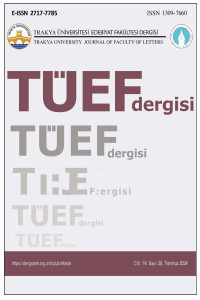Abstract
Çalışmamız Ahmet Hamdi Tanpınar’ın toplumsal eleştiriyi ironik bir üslupla gerçekleştirdiği “Saatleri Ayarlama Enstitüsü” adlı eseridir. “Büyük Ümitler, Küçük Hakikatler, Sabaha Doğru, Her Mevsimin Sonu Vardır” başlıkları altında dört bölümden oluşan eserin her bir bölümü kendi içinde numaralandırılarak alt bölümlere ayrılmaktadır.
Birey ya da toplumun gelişmesi önünde engel olan kişi, kurum ya da toplumsal davranış gibi aksayan yönlerin gösterilip hicvedildiği eserde yazar, metaforlarla toplumsal eleştirisini yapmakta, sözcük seçimi ve temsili nesneler ile eserdeki farklılıkları çarpıcı şekilde ortaya koymaktadır. Eserde toplum ya da kurumlardaki çürümüşlüğü verirken sözcükler arasındaki ilişkiye dikkat etmekte, bu ilişkinin en güçlü şekilde söyleme dönüşmesini sağlamakta ve sözcükler arasındaki karşıtlıklardan faydalanarak ironiyi daha da güçlü hale getirmektedir. Eserde özellikle kurum ya da toplum içinde yanlış olan iş, işlem ya da davranışların daha sonra toplumun genel kabulüne dönüşmesine dikkat çekilmektedir.
Çalışmamızda eserin her bir bölümünde anlatılan olay, kişi, zaman ve yer ile ilgili bilgilerin verildiği “Giriş” bölümü sonrası yazarın eserinde, dikkatimizi çeken, toplumun aksayan yönlerini ironik şekilde ele aldığı eleştirilerine başlıklar halinde yer verilmektedir. Son olarak çalışma sonunda eser hakkında elde edilen bulguların değerlendirildiği “Sonuç” bölümüne yer verilmektedir.
References
- AYTAÇ, Gürsel (1999), Çağdaş Türk Romanları Üzerine İncelemeler, Gündoğan Yayınları, 2. Baskı, Ankara.
- KAPLAN, Mehmet (1978), Edebiyatımızın İçinden, Dergâh Yayınları, İstanbul.
- MORAN, Berna (1998), Türk Romanına Eleştirel Bir Bakış 1, İletişim Yayınları, 7. Baskı, İstanbul.
- ÖZHER KOÇ, Sema (2013), “Eşik Kavramı ve Tanpınar’ın Saatleri Ayarlama Enstitüsü Adlı Romanında Bu Kavramın Görüntü Biçimi: Muaddel Saatler/Muaddel Aydınlar”, Türk Dili ve Edebiyatı Dergisi, 48.48, 137-150.
- TANPINAR, Ahmet Hamdi (2002), Mücevherlerin Sırrı, Yapı Kredi Yayınları, İstanbul.
- TANPINAR, Ahmet Hamdi (2021), Saatleri Ayarlama Enstitüsü, Dergâh Yayınları, 60. Baskı, İstanbul.
Abstract
Our study is Ahmet Hamdi Tanpınar's work "Saatleri Ayarlama Enstitüsü" in which he realizes social criticism with an ironic style. The work consists of four parts under the titles "Great Hopes, Small Truths, Towards the Morning, Every Season Has an End" and each part is numbered and subdivided into sub-sections.
In the work, in which the faulty aspects such as people, institutions or social behaviors that prevent the development of the individual or society are shown and satirized, the author makes social criticism with metaphors, and reveals the differences in the work strikingly with the choice of words and representative objects. While describing the decay in society or institutions, the author pays attention to the relationship between words, ensures that this relationship is transformed into the strongest discourse and makes the irony even stronger by making use of the contrasts between words. In the work, attention is drawn especially to the fact that the work, transactions or behaviors that are wrong within the institution or society later turn into the general acceptance of the society.
In our study, after the "Introduction" section, in which information about the event, person, time and place described in each part of the work is given, the author's criticisms that draw our attention and ironically address the faulty aspects of the society in his work are given under headings. Finally, at the end of the study, there is a "Conclusion" section in which the findings obtained about the work are evaluated.
References
- AYTAÇ, Gürsel (1999), Çağdaş Türk Romanları Üzerine İncelemeler, Gündoğan Yayınları, 2. Baskı, Ankara.
- KAPLAN, Mehmet (1978), Edebiyatımızın İçinden, Dergâh Yayınları, İstanbul.
- MORAN, Berna (1998), Türk Romanına Eleştirel Bir Bakış 1, İletişim Yayınları, 7. Baskı, İstanbul.
- ÖZHER KOÇ, Sema (2013), “Eşik Kavramı ve Tanpınar’ın Saatleri Ayarlama Enstitüsü Adlı Romanında Bu Kavramın Görüntü Biçimi: Muaddel Saatler/Muaddel Aydınlar”, Türk Dili ve Edebiyatı Dergisi, 48.48, 137-150.
- TANPINAR, Ahmet Hamdi (2002), Mücevherlerin Sırrı, Yapı Kredi Yayınları, İstanbul.
- TANPINAR, Ahmet Hamdi (2021), Saatleri Ayarlama Enstitüsü, Dergâh Yayınları, 60. Baskı, İstanbul.
Details
| Primary Language | Turkish |
|---|---|
| Subjects | Modern Turkish Literature in Turkiye Field, New Turkish Language (Turkish of Old Anatolia, Ottoman, Turkiye) |
| Journal Section | Research Article |
| Authors | |
| Early Pub Date | July 25, 2024 |
| Publication Date | July 29, 2024 |
| Submission Date | March 20, 2024 |
| Acceptance Date | May 21, 2024 |
| Published in Issue | Year 2024 Volume: 14 Issue: 28 |

